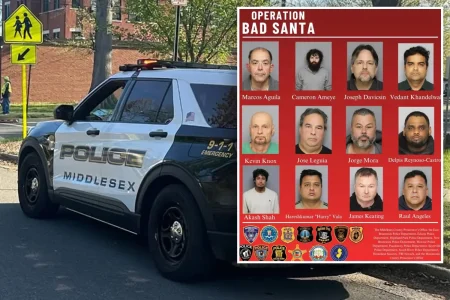The quiet community of Oroville, California, was shattered on Wednesday, December 4th, when a gunman opened fire at the Feather River Adventist School, injuring two young kindergartners. The shooter, identified as 56-year-old Glenn Litton, tragically ended his own life shortly after the attack. This senseless act of violence left the community reeling and searching for answers amidst the heartbreak. Authorities quickly launched an investigation, piecing together Litton’s troubled past and attempting to understand the motivations behind this horrific event.
The two young victims, Roman Mendez, 6, and Elias Wolford, 5, suffered grave injuries. Mendez was shot twice, while Wolford sustained a single gunshot wound to the abdomen, requiring extensive and ongoing medical care. The road to recovery for these two children will be long and arduous, both physically and emotionally. The small, close-knit community of Feather River Adventist School, with its enrollment of just 35 students, has been deeply impacted by this tragedy, facing the difficult task of healing and supporting the affected families.
Investigators revealed that Litton had utilized the alias Michael Sanders to schedule a meeting with the school’s principal, feigning interest in enrolling his grandson. This deceptive tactic allowed him to gain access to the campus. Following the meeting, Litton unleashed a volley of gunfire, striking the two young boys before turning the gun on himself. Authorities believe the meeting was a premeditated ruse, carefully orchestrated to facilitate his attack.
Unraveling the complexities of Litton’s motives, investigators uncovered disturbing writings attributed to him. In these writings, Litton claimed to be acting on behalf of an “International Alliance,” citing the United States’ involvement in geopolitical conflicts as justification for his actions. He specifically referenced “child executions” as a countermeasure to American foreign policy. Sheriff Kory Honea, however, attributed these writings to Litton’s documented history of mental health struggles, dating back to his teenage years. Honea suggested that Litton had constructed a distorted reality from disparate sources of information, leading to the tragic events.
Litton’s past painted a picture of a troubled individual with a lengthy criminal history. His record included convictions for identity theft, fraud, forgery, and drug-related offenses. He had served multiple stints in California State Prison, his most recent release occurring just weeks before the school shooting. Following his release, he stole a moving truck near San Francisco, adding another charge to his extensive record. This pattern of criminal activity, coupled with his mental health struggles, underscores the complex and troubling circumstances surrounding the shooting.
The tragic incident at Feather River Adventist School serves as a grim reminder of the vulnerability of our schools and the urgent need for increased security measures. The community rallied around the victims and their families, offering support and prayers during this difficult time. The school expressed gratitude to the swift actions of law enforcement, who undoubtedly prevented further tragedy. The FBI joined local authorities in the investigation, working tirelessly to piece together the events leading up to the shooting and to understand the motivations of the shooter. As the community grapples with the aftermath of this devastating event, the focus remains on the recovery of the two young victims and providing support to their families. This incident underscores the need for a broader conversation about mental health, access to firearms, and school safety, in an effort to prevent future tragedies.











